The overall program and level of psychiatric offerings at McLean is high. The detox unit, however, is quite poor in some respects. The unit is “conservative” in its use of benzos, and many patients are left to truly suffer without adequate palliative care. They employ qu ...
About McLean Hospital
McLean Hospital is located in Belmont, Massachusetts. They help people who are battling addiction and psychiatric issues. Their motto is they don’t just treat addiction, they treat people. They’ll work with you on an individual basis to give you the help you need that’s right for your situation. They offer inpatient and outpatient care.
Treatment for Co-Occurring Conditions
This treatment center recognizes that addiction often comes with mental health conditions like bipolar disorder, OCD, depression and or borderline personality disorder. They also work with people who are battling severe anxiety and depression, schizophrenia, eating disorders as well as those struggling with trauma or PTSD.
What Clients Are Saying
Previous patients say the help they provide for OCD is amazing. They report that the regular inpatient program isn’t perfect but it’s better than others. Clients say staff here show interest in you, remember little details and make you feel like you’re really cared about.
Latest Reviews
We take negative feedback very seriously. Please reach out to our Senior Manager, Safety, Risk, Patient Family Relations, at 617.855.3128 to discuss your experience.
Rehab Score
Gallery
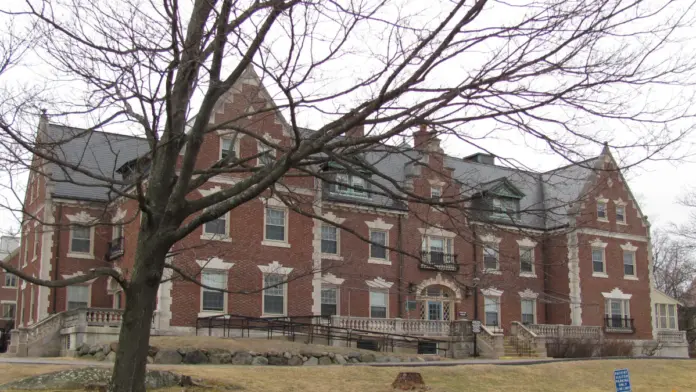
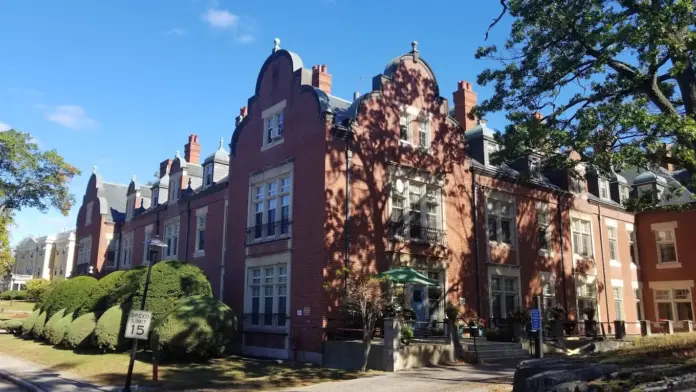
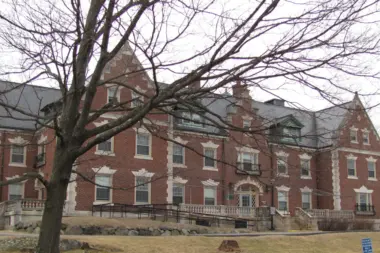
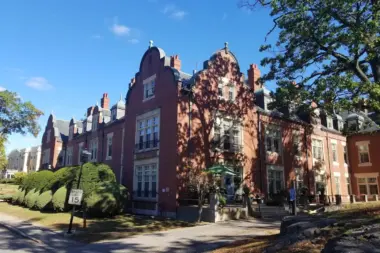
Accepted Insurance
Other Forms of Payment
Medicaid is a state based program that helps lower-income individuals and families pay for healthcare. Medicaid covers addiction treatment so those enrolled can use their coverage to pay for rehab. When a program accepts Medicaid the client often pays very little or nothing out of their own pocket.
Private insurance refers to any kind of healthcare coverage that isn't from the state or federal government. This includes individual and family plans offered by an employer or purchased from the Insurance Marketplace. Every plan will have different requirements and out of pocket costs so be sure to get the full details before you start treatment.
Self-pay involves paying for treatment out of your own pocket. You can use savings or credit, get a personal loan, or receive help from family and friends to fund your treatment. If you don't have insurance or your insurance plan doesn't cover a specific program, self-pay can help ensure you still get the care you need.
Financial aid can take many forms. Centers may have grants or scholarships available to clients who meet eligibility requirements. Programs that receive SAMHSA grants may have financial aid available for those who need treatment as well. Grants and scholarships can help you pai for treatment without having to repay.
Medicare is a federal program that provides health insurance for those 65 and older. It also serves people under 65 with chronic and disabling health challenges. To use Medicare for addiction treatment you need to find a program that accepts Medicare and is in network with your plan. Out of pocket costs and preauthorization requirements vary, so always check with your provider.
Military members, veterans, and eligible dependents have access to specific insurance programs that help them get the care they need. TRICARE and VA insurance can help you access low cost or no cost addiction and mental health treatment. Programs that accept military insurance often have targeted treatment focused on the unique challenges military members, veterans, and their families face.
Sliding scale payments are based on a client's income and family size. The goal is to make treatment affordable to everyone. By taking these factors into account, addiction recovery care providers help ensure that your treatment does not become a financial burden to you or your family, eliminating one barrier to care.
Private insurance refers to any kind of healthcare coverage that isn't from the state or federal government. This includes individual and family plans offered by an employer or purchased from the Insurance Marketplace. Every plan will have different requirements and out of pocket costs so be sure to get the full details before you start treatment.
Addiction Treatments
Levels of Care
Outpatient programs are for those seeking mental rehab or drug rehab, but who also stay at home every night. The main difference between outpatient treatment (OP) and intensive outpatient treatment (IOP) lies in the amount of hours the patient spends at the facility. Most of the time an outpatient program is designed for someone who has completed an inpatient stay and is looking to continue their growth in recovery. Outpatient is not meant to be the starting point, it is commonly referred to as aftercare. McLean's approach to outpatient treatment is focused on comprehensive evaluation and stabilization. Most clinical services provided are designed to be short-term. Should longer-term treatment be necessary, they will assist patients in finding appropriate community resources. Some longer-term treatment is provided in the form of group psychotherapy and through the residency training program.
Drug and alcohol addiction often takes a heavy toll on one's body. Over time, a physical dependence can develop, meaning the body physiologically needs the substance to function. Detox is the process of removing drugs and/or alcohol from the body, a process that can be lethal if mismanaged. Medical detox is done by licensed medical professionals who monitor vital signs and keep you safe, healthy, and as comfortable as possible as you go through detox and withdrawal.
The Adult Inpatient Services provide thorough, individualized diagnosis and treatment alongside stabilization of acute symptoms. Covered by most health insurance providers, their programs are most appropriate for individuals ages 17 and older experiencing psychiatric illness that may be related to mood and anxiety and/or psychotic disorders, with or without co-occurring mental health conditions such as substance use disorders. They offer intensive, short-term, around the clock care, with patient stays varying between 3 and 14 days. Patients follow structured schedules—combining group, family, and individual therapy—targeted at reducing the severity of the patient’s symptoms and focused on different cognitive behavioral therapy strategies to prevent relapse. Designed to engage patients in their recovery, each day is carefully planned with ample time for treatment, self-focus, team meetings, and expressive arts therapy. The Adolescent Acute Residential Treatment (ART) Program provides intensive, short-term, and highly focused psychiatric care for teens and young adults through age 19 with emotional and behavioral difficulties.
The treatment team works closely with the individual as well as with family, significant friends, and outside providers to develop a personalized aftercare plan. Recommendations by staff are made based upon clinical needs, progress made during treatment, and long-term treatment goals.
Their expert clinical teams specialize in a wide range of mental health disorders and is devoted to improving the quality of life of patients and their families. The programs’ comfortable accommodations are an ideal setting for patients to focus on recovery. Their 24-hour care also includes available emergency psychiatric and medical personnel.
Intervention services helps family or friends of addicts stage an intervention, which is a meeting in which loved ones share their concerns and attempt to get an addict into treatment. Professional intervention specialists can help loved ones organize, gather, and communicate with an addict. They can guide intervention participants in describing the damage the addict's behavior is causing and that outside help is necessary to address the addiction. The ideal outcome of an intervention is for the addict to go to rehab and get the help they need.
12-step programs are addiction recovery models based on Alcoholics Anonymous (AA). A number of substance abuse programs (including some drug and alcohol rehab centers) use the 12 steps as a basis for treatment. Beginning steps involve admitting powerlessness over the addiction and creating a spiritual basis for recovery. Middle steps including making direct amends to those who've been hurt by the addiction, and the final step is to assist others in addiction recovery in the same way. 12-Step offshoots including Narcotics Anonymous (NA), Cocaine Anonymous (CA), Dual Recovery Anonymous (DRA), Sex and Love Addicts Anonymous (SLAA) and Gamblers Anonymous (GA).
Sober Living Houses (SLHs), aka sober homes or halfway houses, are safe, substance-free, supportive living facilities for those recovering from substance abuse. Ideal for those who've just been through inpatient or outpatient treatment, SLHs are supervised environments with rules that support sobriety, such as curfews, shared chores, and therapeutic meetings. Residents are also often trained on life skills and coping skills to make it easier to transition into society. SLHs also provide a strong sense of community that can lead to the kind of deep and lasting connections with other sober individuals that supports a new, healthy lifestyle.
A partial hospitalization program (PHP), also known as day treatment, allows you to receive rehab-level care while living at home. PHP treatment requires a minimum of 20 hours of treatment each week for an average of 90 days. PHP treatment plans can vary depending on your needs but typically includes relapse prevention, medication management, and evidence-based therapies, such as cognitive-behavioral therapy (CBT), and dialectical behavior therapy (DBT). Most insurance providers fully or partially cover PHP treatment.
Intensive outpatient programs (IOP) facilitate clients' sustained sobriety through high-level care aligned with their evolving needs. Clients engage in multiple treatment sessions per week, typically receiving between nine and 20 hours of outpatient care weekly. The frequency and intensity of treatment gradually decreases as clients stabilize. Many intensive outpatient rehabs offer a variety of services, including addiction counseling, recovery-focused life skills training, and medication assisted treatment (MAT). Evidence-based complementary therapies are also common.
Treatments
The goal of treatment for alcoholism is abstinence. Those with poor social support, poor motivation, or psychiatric disorders tend to relapse within a few years of treatment. For these people, success is measured by longer periods of abstinence, reduced use of alcohol, better health, and improved social functioning. Recovery and Maintenance are usually based on 12 step programs and AA meetings.
Addiction is a highly complex problem, and drug rehab in Massachusetts is often necessary to address it. These programs treat physical, mental, and relational issues that are involved. Treatment empowers individuals to manage these issues without the use of drugs.
Many of those suffering from addiction also suffer from mental or emotional illnesses like schizophrenia, bipolar disorder, depression, or anxiety disorders. Rehab and other substance abuse facilities treating those with a dual diagnosis or co-occurring disorder administer psychiatric treatment to address the person's mental health issue in addition to drug and alcohol rehabilitation.
A combined mental health and substance abuse rehab has the staff and resources available to handle individuals with both mental health and substance abuse issues. It can be challenging to determine where a specific symptom stems from (a mental health issue or an issue related to substance abuse), so mental health and substance abuse professionals are helpful in detangling symptoms and keeping treatment on track.
Opioid rehabs specialize in supporting those recovering from opioid addiction. They treat those suffering from addiction to illegal opioids like heroin, as well as prescription drugs like oxycodone. These centers typically combine both physical as well as mental and emotional support to help stop addiction. Physical support often includes medical detox and subsequent medical support (including medication), and mental support includes in-depth therapy to address the underlying causes of addiction.
Programs
Adult rehab programs include therapies tailored to each client's specific needs, goals, and recovery progress. They are tailored to the specific challenges adult clients may face, including family and work pressures and commitments. From inpatient and residential treatment to various levels of outpatient services, there are many options available. Some facilities also help adults work through co-occurring conditions, like anxiety, that can accompany addiction.
McLean Hospital understands that police, active military and other first responders endure unique on-duty and personal stresses, and also face many obstacles in seeking help. The LEADER (Law Enforcement, Active Duty, Emergency Responder) program at McLean Hospital is proud to provide specialized mental health and addiction services, designed specifically for men and women in uniform.
Young adulthood can be an exciting, yet difficult, time of transition. Individuals in their late teens to mid-20s face unique stressors related to school, jobs, families, and social circles, which can lead to a rise in substance use. Rehab centers with dedicated young adult programs will include activities and amenities that cater to this age group, with an emphasis on specialized counseling, peer socialization, and ongoing aftercare.
Teen programs are designed to address the unique pressures teens face, pressures that can drive them to experiment with dangerous, addictive substances. They need programs that meet them exactly where they are and give them tools for long-term recovery. Therapy can help teenagers understand and work through underlying issues so they can reclaim the life ahead of them.
The providers who specialize in the children's rehab space understand the specialized needs that this population faces. School-based and social services such as tutoring and family counseling are often central to treatment. Child programs may also address the needs of youth experiencing substance abuse in the home, including a parent's or sibling's addiction.
Nearly one million adults age 65 and older live with a substance use disorder. Treatment providers who specialize in senior care understand the social, psychological, and physical effects of aging and how they relate to recovery. They can help clients address particular challenges and risks they may face as they get older such as overdosing and medication interactions and dependencies.
Clinical Services
Cognitive Behavioral Therapy (CBT) is a therapy modality that focuses on the relationship between one's thoughts, feelings, and behaviors. It is used to establish and allow for healthy responses to thoughts and feelings (instead of unhealthy responses, like using drugs or alcohol). CBT has been proven effective for recovering addicts of all kinds, and is used to strengthen a patient's own self-awareness and ability to self-regulate. CBT allows individuals to monitor their own emotional state, become more adept at communicating with others, and manage stress without needing to engage in substance abuse.
McLean’s adolescent dialectical behavior therapy programs, collectively known as 3East, provide specialized care for teens and young adults who require treatment for depression, anxiety, post-traumatic stress disorder (PTSD), and emerging borderline personality disorder (BPD). Symptoms of these conditions include suicidal thoughts and behavior, self-injury (such as cutting), disordered eating, drug and alcohol abuse, impulsivity, and significant interpersonal difficulties. In addition to DBT, the programs also utilize DBT+prolonged exposure (DBT+PE)—an evidence-based therapy that has increasingly become the gold standard treatment for anxiety disorders and trauma.
Experiential therapy is a form of therapy in which clients are encouraged to surface and work through subconscious issues by engaging in real-time experiences. Experiential therapy departs from traditional talk therapy by involving the body, and having clients engage in activities, movements, and physical and emotional expression. This can involve role-play or using props (which can include other people). Experiential therapy can help people process trauma, memories, and emotion quickly, deeply, and in a lasting fashion, leading to substantial and impactful healing.
Families are integral to treatment. They ask that they participate in family meetings and also offer parent support groups. Parents are invited to visit and at a certain point are encouraged to take their child on passes to leave campus. Clinical social workers are available regularly for phone feedback and consultation. As a resource and partner within the community, they also make extensive effort to involve community treaters, including therapists, agencies, and schools, in treatment and aftercare planning.
Group therapy is any therapeutic work that happens in a group (not one-on-one). There are a number of different group therapy modalities, including support groups, experiential therapy, psycho-education, and more. Group therapy involves treatment as well as processing interaction between group members.
In individual therapy, a patient meets one-on-one with a trained psychologist or counselor. Therapy is a pivotal part of effective substance abuse treatment, as it often covers root causes of addiction, including challenges faced by the patient in their social, family, and work/school life.
Also included in their treatment approach are life skills groups, which include activities such as cooking and food shopping trips as well as community outings to bookstores, cafes, bowling alleys, malls, and museums. Weekly community outings are designed to build skills, support, and independence. They also take longer seasonal trips to places such as Martha’s Vineyard, Rockport, and Newport, Rhode Island.
Motivational Interviewing (MI) is a clinical approach to helping people with substance abuse issues and other conditions shift behavior in positive ways. It is more goal-oriented than traditional psychotherapy, as MI counselors directly attempt to get clients to consider making behavioral change (rather than wait for them to come to conclusions themselves). Its primary purpose is to resolve ambivalence and help clients become able to make healthy choices freely.
Nicotine Replacement Therapy (NRT) is a way of getting nicotine into the bloodstream without smoking. It uses products that supply low doses of nicotine to help people stop smoking. The goal of therapy is to cut down on cravings for nicotine and ease the symptoms of nicotine withdrawal.
Nutrition therapy, aka medical nutrition therapy (MNT), is a way of treating physical, emotional, and medical conditions through diet. Specific dietary plans are designed by professional nutritionists or registered dietitians, and patients follow them in order to positively affect their physical and mental health.
At the Dissociative Disorders and Trauma Inpatient Program, they provide a comprehensive range of services for adults who suffer from the effects of childhood abuse or other painful traumatic events. Their staff is particularly attuned to the needs of our patient population and has extensive experience working with individuals who have presented with such conditions as depression, post-traumatic stress and personality disorders. The Dissociative Disorders and Trauma Inpatient Program is located in Proctor House, one of several historic buildings on the McLean campus.
Amenities
-
Residential Setting
-
Private Rooms
-
Yoga Studio
-
Wifi
-
Gym
-
Gardens
-
Recreation Room
Staff & Accreditations
Staff

Alice W. Asby, MD, JD
Associate Psychiatrist, Adult Outpatient Services
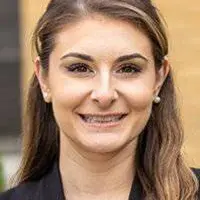
Lauren Asermely, AGPCNP-BC
Nurse Manager, Psychiatric Neurotherapeutics Program

Olivera J. Bogunovic, MD
Medical Director, Alcohol, Drug, and Addiction Outpatient Program

Paula Bolton, MS, CNP, ANP-BC
Program Director, Psychiatric Neurotherapeutics Program
Accreditations

The Joint Commission, formerly known as JCAHO, is a nonprofit organization that accredits rehab organizations and programs. Founded in 1951, the Joint Commision's mission is to improve the quality of patient care and demonstrating the quality of patient care.
Joint Commission Accreditation: Yes

The National Association of Addiction Treatment Providers (NAATP) is a professional association that represents organizations in the field of addiction services. Founded in 1978, NAATP's mission is to advance addiction services and ensure that high-quality addiction treatment is available and accessible.
NAATP Member: Yes
Member ID: 319

The Substance Abuse and Mental Health Services Administration (SAMHSA) is a branch of the U.S. Department of Health and Human Services. Established in 1992 by congress, SAMHSA's mission is to reduce the impact of substance abuse and mental illness on American's communities.
SAMHSA Listed: Yes



